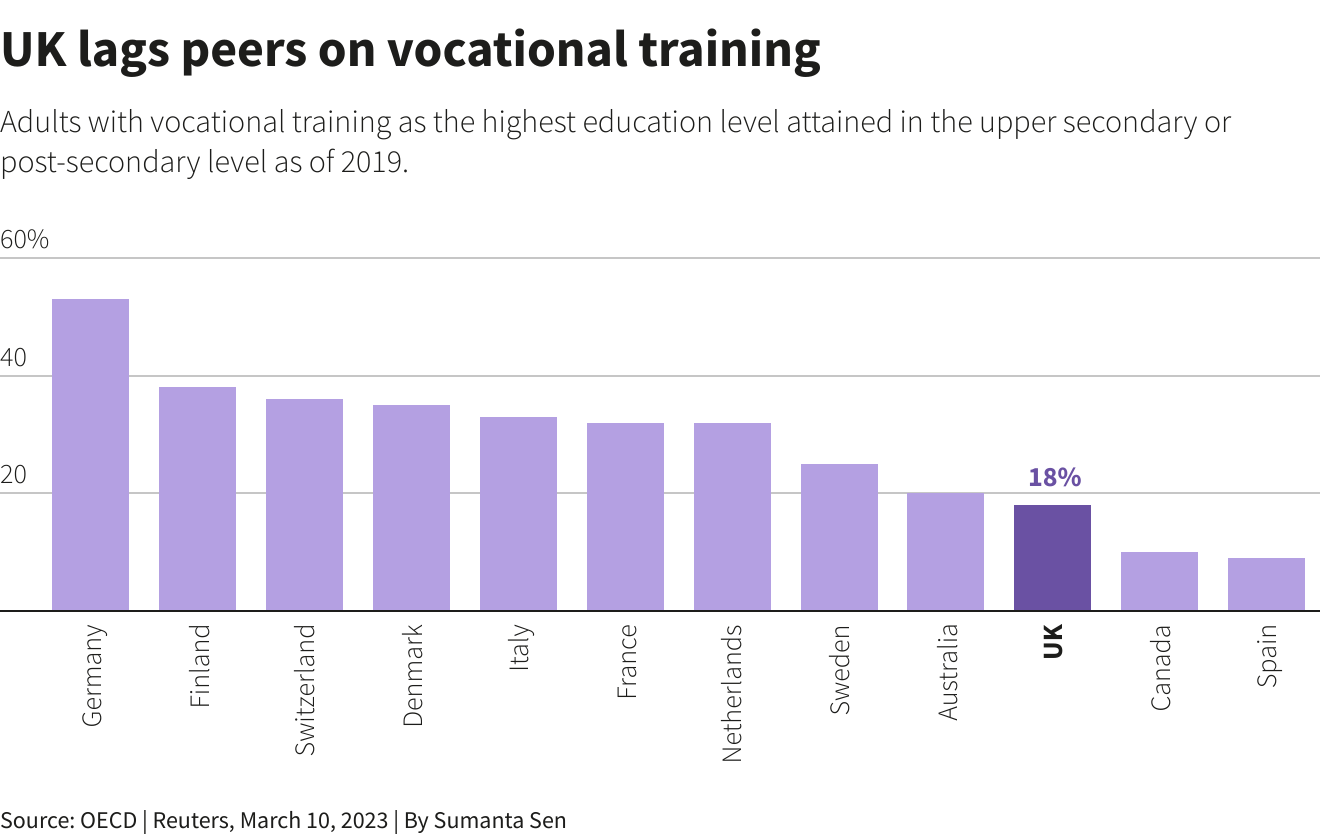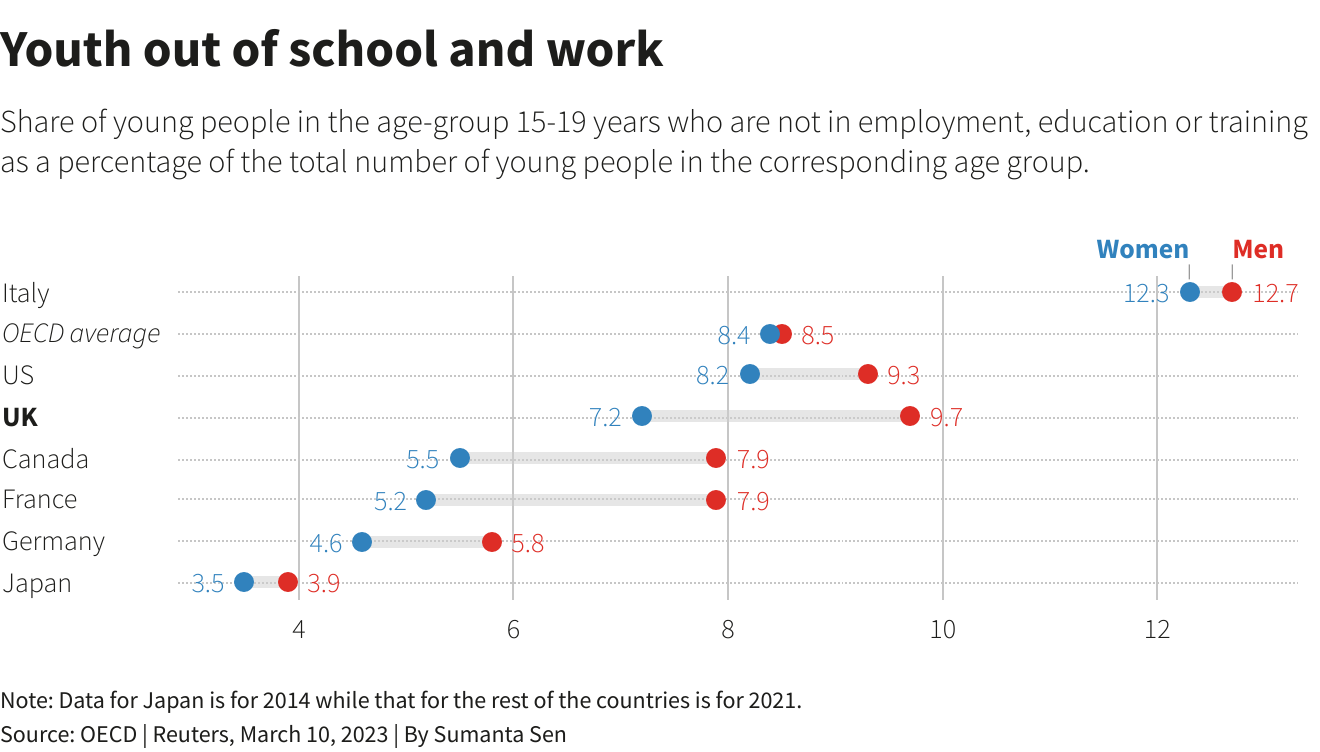
UK employers feel the strain of missing skilled workers
Finding that new starters often struggle to think on their feet, he sets them workplace challenges to learn to solve problems at pace and in teams. Many don't adapt, leading to high attrition after three- and six-month reviews.
Across Britain, Biltcliffe's frustrations are shared by businesses who say the nation's schools, technical colleges and apprentice schemes are not turning out the workers they need, from software coders and designers to skilled machinists.
"There needs to be a step change," Biltcliffe said, speaking at the offices of Webmart - which advises clients on the carbon footprint of their marketing operations - in an industrial estate in Barnsley, a former coal town in northern England. Neighbouring businesses include an IT security firm and other companies far removed from the region's mining past.
Biltcliffe described the education system as "not fit for purpose" in a changing economy where the growth of automation and artificial intelligence will make creative skills and adaptability all the more important.
While Britain boasts world-leading universities, top scientists and a growing share of young people who continue academic studies after 18, less than a fifth of 25-64 year-olds have a vocational qualification, compared with more than half in Germany, according to the Organisation for Economic Co-operation and Development.

Finance minister Jeremy Hunt is expected to address this skills shortage in a budget statement on Wednesday that he will frame as a growth plan for Britain's economy - still the only one in the Group of Seven yet to recover its pre-coronavirus pandemic size.
But past attempts to train up more workers have seen the problem get worse by some measures, and any big improvement to the post-16 skills system is likely to take years.
The shortage of qualified workers is not unique to Britain but it has been exacerbated by the country's exit from the European Union, which has created more paperwork and cost for employers hiring workers from the bloc. That has contributed to a surge in unfilled vacancies to record levels last year.
Digital roles are growing four times faster than the workforce as a whole, and there are an average of 173,000 vacancies per month for digital occupations, costing the economy tens of billions of pounds each year, according to the government.
Biltcliffe and other employers argue that changes need to be made not only in post-school training, but in schools themselves, which they and some educational campaigners criticise for increasingly promoting memorisation for tests at the expense of creative thinking and practical learning.
The Edge Foundation, which seeks to improve ties between education and employers, says time for subjects such as computing and practical science work has been squeezed over the past decade, and that 71% fewer pupils studied design and technology courses to exam level in 2022 than in 2010.
Subjects that have seen big increases over the past decade included geography and history.
Despite the focus on exams, around 100,000 people leave school every year without required standards in English and maths and Britain has one of the highest rates of young people not in education, employment or training among the world's leading economies.

"We don't do nearly as well for the 50% of school leavers who do not go to university as we do for those who do," Hunt said in January.
In response to a question from Reuters about the Edge Foundation data, the education ministry said every state-funded school was "required to teach a broad and balanced curriculum."
TRAINING REVAMP
Without a rapid overhaul of the training system, Britain's pool of highly skilled adults is likely to shrink further relative to other countries, the OECD has warned.
Employers groups are calling on Hunt to tackle a key part of how training is funded in his budget speech.
Since 2017, firms with an annual pay bill of more than 3 million pounds have been required to pay an Apprenticeship Levy - a tax placed in a fund the companies can draw on for training.
Employers say they often cannot find suitable training courses, and over 2 billion pounds of unused funds raised have gone to government coffers.
A House of Commons Library report said in January that the government acknowledged the number of apprenticeships had fallen since the levy was introduced, but argued that the quality of apprenticeships had improved.
The Confederation of British Industry, a business lobby group, wants Hunt to allow firms to invest the money in a wider range of training, not just apprenticeships, citing its own research predicting nine out of 10 British workers will need to retrain by 2030 to adapt to changes in the economy.
The Treasury said on Saturday that Hunt will announce training for older people returning to work that would be more flexible and shorter than other programmes, alongside the expansion of a scheme for reskilling in industries such as construction and technology.
Corporate leaders acknowledge employers also need to do more themselves, and prioritize training even in lean times.
"Training is the first thing that goes when the budget is squeezed," Robert West, head of education and skills at the CBI, said.
BRIGHT SPOTS
At Webmart - with 43 staff and annual sales of about 20 million pounds - Biltcliffe says getting new hires up to speed in how to engage with clients or meet deadlines acts as a brake at a time when demands are getting ever more immediate.
"You're slowing down really quite a lot to go at the pace of the education system," he said of his company, which began as a print management firm in 1996.
Olly Newton, executive director of the Edge Foundation, says there are bright spots, including schools trying out new ideas.
"I think there's a real head of steam to do something different," Newton said.
One such school is the publicly funded XP in Doncaster, 20 miles from Barnsley.
Children joining XP at age 11 immediately go on a trip to the mountains of England or Wales to learn to cope with new challenges and the importance of teamwork.
Inspired by project-based learning schools in the United States, XP sends students out of classrooms to dig into issues such as migration or the impact of the closure of the local mining industry, requiring them to engage with adults and understand the world around them.
"Our students are more reflective than a lot of adults," Claira Salter, XP's principal, said. "Our students can walk into any interview with confidence and talk about themselves."
By the time they leave XP at 16, all pupils have experience of speaking to groups of 250 people about their work.
Last year, all 50 students who graduated from XP stayed in education or went into employment or training while Doncaster's not in education, employment or training rate for 16-17 year-olds stood at nearly 5% in early 2022.
"We're interested really in things that go on beyond normal school life and equipping kids for their future," Salter said.











